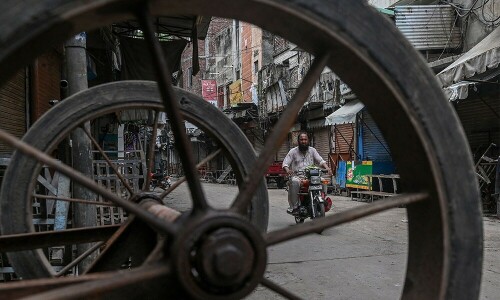Karachi and Lahore Markets Affected by Strike Against Tax Measures
The two largest cities in Pakistan, Karachi and Lahore, experienced partial to complete market shutdowns on Saturday. This was due to a strike called by traders protesting what they described as “anti-business” taxation policies included in the Finance Act 2025.
The government, through the Finance Act, broadened the authority of the Federal Board of Revenue (FBR) by introducing Sections 37A and 37B, which grant FBR officials powers of arbitrary arrest. Additionally, Section 21(S) imposes stringent penalties on cash transactions exceeding Rs200,000. The act also mandates digital invoicing under SRO 709 and implements e-Bilty under Section 40(C).
Business Community’s Response
Describing these measures as detrimental to business, the business community initially announced a nationwide strike. They also advocated for the reinstatement of the Final Tax Regime for exporters.
Divisions emerged within the business community later. The Federation of Pakistan Chambers of Commerce and Industry (FPCCI) chose to postpone the protest following discussions with government representatives. However, the Karachi Chamber of Commerce and Industry (KCCI) declared its intention to proceed with the strike.
Notably, Karachi’s New Sabzi Mandi (vegetable market) witnessed a total shutdown for the first time.
The KCCI spearheaded the strike, receiving support from the Lahore Chamber of Commerce & Industry (LCCI), the Hyderabad Chamber of Small Traders & Small Industry (HCSTSI), among others. Reports indicated that Islamabad, the capital of Pakistan, was also significantly impacted.
Transportation Impact
Malik Shabbar Khan, Patron in Chief of the United Goods Transport Alliance, informed that two prominent transport alliances in the nation, the United Goods Transport Alliance and the Pakistan Goods Transport Alliance, were backing the KCCI.
Khan stated that all bookings had been suspended. He pointed out that goods transport would take approximately five days to cease entirely.
Khan added, “This legislation will adversely affect us. For instance, a goods truck traveling from Peshawar to Karachi and back incurs approximately Rs100,000 in tolls and various challans. Discussions with KCCI leaders indicated that if demands are unmet, weekly strikes could be considered. This decision will be finalized after consulting with the broader business community.”
Sabzi Mandi Situation
Haji Mehboob Shair, a veteran fruit merchant, commented that this was the first instance of a complete strike in the history of the Sabzi Mandi.
Shair noted that typically, a significant number of trucks carrying fruits and vegetables arrive at the Sabzi Mandi daily, but none arrived on Saturday.
As of 3 p.m., main markets and commercial zones in Karachi remained closed. A limited number of markets in areas such as Clifton and Landhi were operational.
Negotiations and Stance of Chambers
KCCI President Muhammad Jawed Bilwani, along with other business leaders, briefed the media late Friday regarding a meeting with the Special Assistant to the Prime Minister (SAPM) on Industries, Haroon Akhtar Khan, which included participation from various chambers via Zoom.
Bilwani said that business leaders received no written assurances. He then announced the KCCI’s decision to move forward with the strike.
LCCI President Mian Abu Zar Shaad affirmed that the Lahore chamber had resolved to join the strike as a gesture of solidarity with the wider business community.
Traders in Hyderabad also supported the strike, resulting in the closure of commercial districts such as Saddar Bazaar, Resham Bazaar, Anaj Mandi, and Market Tower.
The FPCCI’s decision to postpone the strike was followed by chambers and associations in Rawalpindi, Sialkot, Gujranwala, Quetta, Khanewal, Multan, Bajaur, and other locations.



Comments (0)
No comments yet. Be the first to comment!
Leave a Comment